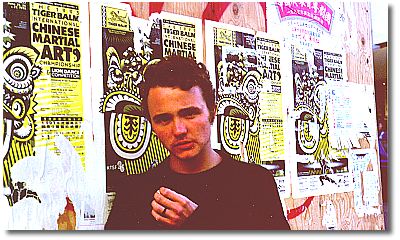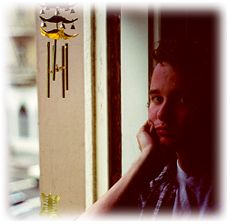
Sun Rising: San Francisco Refugee Poet
By Andrea Perkins
Richard Sun was only kidding when he pulled a gun on his now ex-girlfriend because she went somewhere without telling him.
"That was another reason why I had to leave that wretched city," he says, referring to San Francisco. "But not the most important reason."
After three weeks of hard-core self-reflection in the slammer, Sun, 30, made the decision that would forever alter his life. "And perhaps all of history," he adds. He had an M.F.A., a book, publications in national poetry journals, but was still a big fat nobody. He was just one of many modern-day poets trying to make it in a city famous for the beat writers of a now dead past. He was going nowhere fast. Not only was he starting to behave like a psychotic maniac, he wasn't even able to write a single word.
"I needed new territory, terra incognita, and like the frontiersmen of old, I set out to find it."
Meet Mr. Richard Sun, poet, maniac, and the winner of the Western Humanities Review's Competition for Utah Writers. "Jail really makes you face yourself," he explains, "I mean, they never turn the lights out so there's quite literally no place to hide. The minute I was on the street again, I went straight to the Greyhound station. I didn't know where I was going exactly, just had this vague notion of a place that wasn't San Francisco, where I'd resided for over ten years. I bought the next ticket outta there and somehow winded up in Missoula with these two wacky chicks. Then through a series of twists and turns far too lugubrious to tell you about, I woke up in Utah. ‘Utah!' said I out loud to myself. The word sounded good in my mouth, like a brand new word that no one had ever said before." Sun flicks his cigarette butt into the gutter, strutting like a diminutive monarch or saddle-sore cowboy. "Did Kerouac or Ginsberg ever write about Utah? Did anybody? Jack described Salt Lake in passing as a "city of sprinklers," but beyond that, I can think of nothing noteworthy. UTAH! Here was my Newfoundland and I felt very confident at that time that I was probably the only poet in it. At last!" he exclaims, rubbing his hands together like a ruddy little imp.
Well, Sun wasn't exactly the only word smith in the state, but he had discovered some fairly "unspoiled" literary ground upon which to trod with his big black boots. "Only suckers and athletes sport footwear in any other hue," he proclaims. The arena in which he now began to flaunt himself and his surprisingly resonant work was hardly ready for him.
"I remember going to an open reading with this poem I had just written about my ex-girlfriend that went something like this: ‘The little mistress / proves an authority / of hidden shapes. / Dismiss the sun's / muttering: / old story. / "Love and sweet apocalypse…" Sweetly said and neatly done. / Aggregate of twilight / and several storms / she pilots confessions / and silly death.' Which in my opinion is some really straightforward, albeit alchemical language that even Hemingway would approve of, and these idiot Utahans were all coming up to me afterwards and saying things like, ‘Dude, I like the imagery, but what does it mean?' But at least I was finally free of all the horrid little swarms of posers and sorry-ass sycophants who, even if they didn't know what it meant, would never ask. Finally I was free of the tyranny of history and its dead luminaries. Finally I was somewhere where nothing had ever happened. I felt like I had entered my own kingdom."
No question is as aggravating to Sun as the one he gets asked most frequently: "What does it mean?" His poetry is not symbolic. He hates metaphors. He writes what he sees and experiences directly, without translation. "The poem is an experience," he says, "not a puzzle. If you read it and take each line for what it is and don't try to ‘figure it out' but just actually read it, then you will know the meaning¾if that's what you're after. In my opinion, there's far too much emphasis on meaning. People are afraid to live with questions. I want to glorify the mystery, not assign some arbitrary meaning to it that would only be temporary anyway."
When he's not writing poetry, Sun can be found "suckling a fifth of Jack Daniels like a new born babe does its mama's tit." Though a metaphor, this seems to be an accurate description of his favorite pastime: imbibing booze. His second favorite seems to be getting into fights. When asked why he fosters the bad boy poet image so trendy in recent decades, he replies without blinking, "Girls. I do it to get girls." But do girls like Richard Sun? At his latest reading, several were asked.
"Well, he's sort of cute," said Sandy, 22, "but I don't understand his poetry. It's very bleak, that's all I could gather."
"I think he must have many very deep emotional problems," said Gloria, 25.
"He reminds me of a morbid version of Bill Murray," said Kelly, 21.
"Most people don't recognize genius when they see it," says Sun, whose first book of poems, Assassinations, is due out next fall. It's hard to tell whether or not he's only kidding, but he probably isn't. Sun is not modest, nor is he humble. Dropping nimbly from the limb of a cottonwood tree he has just climbed, he says, "A poet gets nowhere waiting around meekly for approbation from the masses. I don't care what anybody says or thinks about me."
Ripe Shade, Raw Image:
Sun's work exemplifies Williams Carlos Williams' description of the poem as "the cry of its occasion."
"How could such a posturing name dropper write a decent poem?" you ask, no doubt referring to Sun's flavorful, if not entirely dysfunctional, personality. But separate the poetry from the man, and read it, line by line, for what it is, and you will walk away having read some of the "best poetry in the time zone," (according to renowned poet Donald Revel). Remember Beethoven? Think of any artistic genius and their accompanying anti-social behavior and see how Sun, whether by design or his own true nature, fits into their club.
Revel is not the only singer of the one time gun-toter's praises and there's a reason. His unrefined, raw images scathe the mind, resulting in sudden, unprecedented instances of lucidity. These poems are surprises, always managing to defy any attempts at paraphrasing them. They must be read. Suffering no pretension, they are honest and strangely simple. "You and I walking / through ripe shade," writes Sun, "The sacred almost devours."
One wonders if his tough guy facade doesn't perhaps result from the incredible sensitivity of observation his poems reveal. Picture Bruno weeping over a daffodil. Beauty is paramount, and Sun discovers it in all things. Though there is the sense, in this first collection of poetry, that beauty has been a source of betrayal, the poet cannot shun it. Brutality flowers into the tenderest innocence: "I am here with a bucket-full of colors / that malatov into a huge noel."
Perhaps most importantly is the fact that Sun's poems are not symbolic. There isn't anything hiding behind them. He's not trying to fool you. He's not even trying to act like he is smarter than you are. He creates statements, clear and rich and spoken as staight as street talk. Sun does not equivocate. It is a poetry of abrupt vision that entails an almost alchemical transformation. From ashes to Phoenixes and from lead to gold, Sun's poetic project aims at nothing less than rebirth.

From Assassinations:
June
Ruin never tires of living. The sea resumes a hoard
of light. Color blooms in the storybook refugees whose
happiness embellishes their suicide. Crystal mausoleums
cluster near new musics. A watery valley and a frieze of
anonymities fall. No blame perches on a peaked roof. A
Desperate birth stumbles down the stairs. The scene is not
symbolic.
